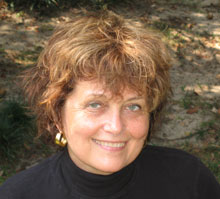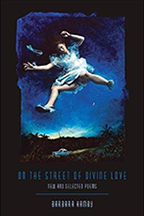 Florida State University Distinguished Research Scholar Barbara Hamby recently released her collection of new and selected poems, On the Street of Divine Love (University of Pittsburgh Press, 2014). In addition to selected past works, On the Street of Divine Love includes fifteen new poems full of humor and introspective revelations. Hamby's impressively rhythmic command of imagery and language leads readers on a journey into the American female consciousness in the new century.
Florida State University Distinguished Research Scholar Barbara Hamby recently released her collection of new and selected poems, On the Street of Divine Love (University of Pittsburgh Press, 2014). In addition to selected past works, On the Street of Divine Love includes fifteen new poems full of humor and introspective revelations. Hamby's impressively rhythmic command of imagery and language leads readers on a journey into the American female consciousness in the new century.
She does this through poems about the ordinary, in which she seeks the astonishing in the mundane, as in her "Ode to Forgetting the Year":
Then there was February when you should have been decapitated
for stupidity. Forget those days and the ones
when you faked a smile so stale it crumbled like a cookie
down the side of your face. Forget the crumbs and the mask
you wore and the tangle of Scotch tape you used to keep it in place,
but then you'd have to forget spring with its clouds of jasmine […]
 "Close observation is the key to any good poem, and our lives are made up of a lot of mundane details," Hamby says. "Choosing those details so they become beautiful is a part of the craft and mystery of art."
"Close observation is the key to any good poem, and our lives are made up of a lot of mundane details," Hamby says. "Choosing those details so they become beautiful is a part of the craft and mystery of art."
Hamby remembers publishing her first story at the age of eight in her elementary school's newspaper, and she has been developing her writing style ever since.
"I think every artist with any body of work must go at it with an obsession," she says. "I can't not work at it."
Reviewers have consistently praised Hamby, the recipient of several literary awards, including an Iowa Short Fiction Award and a Guggenheim Fellowship, both in 2010, for her command of language and poetic structure, which adds rich texture to her verses.
Reviewer Albert Goldbarth celebrates On the Street of Divine Love as "snazzily beatific, unashamedly carnal… and always in love with life and with a multiplex language that proves the love." Billy Collins describes the poems as "wild, outspoken, seriously funny, motor-mouth rambles that take us through hoops of association to places both unexpected and unimpeachable." Donna Seaman writes "even those who profess to dislike or fear poetry will find themselves bedazzled and uplifted by Hamby's long-lined, subtly rhymed, sure-footed, take-me-to-the-bridge lyrics."
Hamby hopes budding writers understand that a successful literary career is built through perseverance and keeping a sense of wonder amidst both glowing recognition and defeating rejection.
"You have to fall back on the things that have always inspired poets: reading, looking at the world, talking to other writers, and spending a lot of time alone at your desk," she says. "I love to think of Picasso's saying, 'Inspiration exists, but it must find us working.'"
Hamby says she fosters much of her creativity through positivity. In her experience, it is anyone's choice to be joyful. There is a notion in literary history that poets are generally depressed or angry, perhaps inspired by such iconic figures as Edgar Allan Poe and Sylvia Plath.
"It is a full-time job to keep one's spirits up," Hamby says. "It's pretty easy to be depressed, gravity being what it is. Working is an antidote to time and gravity."
Hamby lives and works in Tallahassee. She travels extensively, an activity that she credits for kindling her sense of wonder. She stresses the importance of curiosity and exploration for any stage of a writer's career, and finds inspiration in her position as a creative writing professor at FSU.
"I love mentoring students, I think because I got so little of it as a young writer," she says, adding that she faced discouragement as a university student; one professor told her she would never be a poet. "I try to keep her example in mind when I'm working with students. I really can't know who is going to have a breakthrough or when."
Written by Monique Boileau
